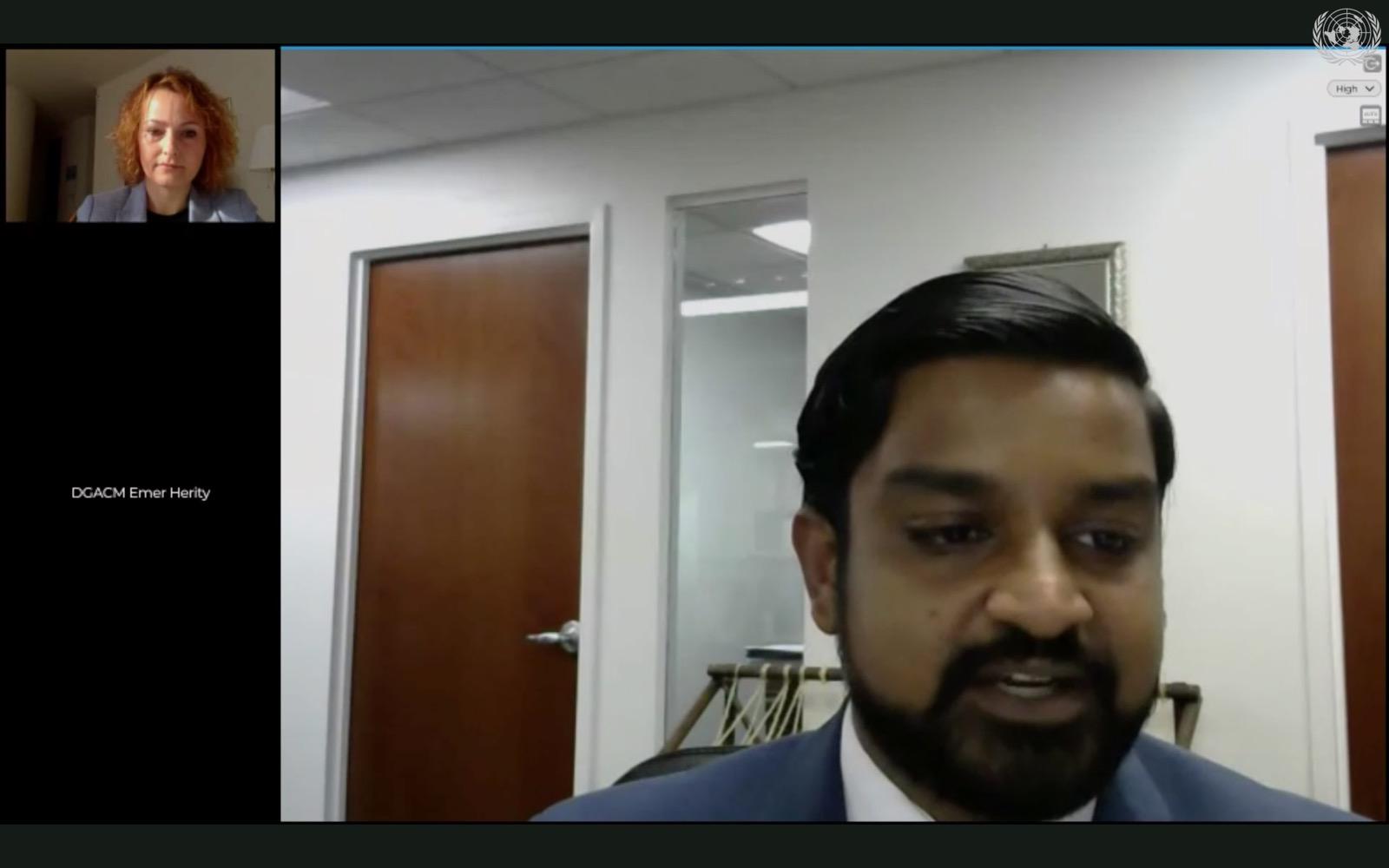Statement by
Hassan Hussain Shihab, Counsellor,
Permanent Mission of Maldives to the United Nations
At the Second Committee
On Agenda Item 19: Sustainable Development
12 October 2020, New York

Thank you, Mr. Chairman,
- The Maldives aligns itself with the statements delivered by the Permanent Representative of Guyana on behalf of the Group of 77 and China, and the Permanent Representative of Belize on behalf of AOSIS. We would also like to thank the Secretary General for his various reports on this agenda item.
- This year, while we celebrate the 75th Anniversary of the founding of the United Nations, less than a decade remains to implement the 2030 Agenda for Sustainable Development. We need to take stock of the first five years of the implementation of the SDGs, so that we may use the best and most effective practices in moving forward. Last year, our message was an optimistic one, that we were making measurable progress in meeting the SDG targets. However, the COVID-19 pandemic has thrown us all into a socioeconomic crisis of unforeseen proportions. In Maldives, our GDP has contracted by 13% and our fiscal deficit increased by 14.5% relative to GDP. COVID-19 has proven to be not just a health pandemic, but an economic plague too, and the IMF has estimated the Maldives to be the hardest hit economy in the region. The tourism industry, the main source of revenue for the Maldives, was completely closed for over a quarter of the year, causing a cash flow crisis to the Government and a revenue shortfall of USD 907.9 million. This is having a radical impact on our development, an impact we will not be able to weather without the support of our friends and partners.
Mr. Chairman,
- The climate emergency is an immediate existential threat to Small Island Developing States, such as my country. For us, it is our lived reality. Extreme weather events such as tidal waves, sea swells, high winds and flooding is the new norm. The frequency and severity of these events is pushing us towards our limits of adaptation. We are seeing these changes not just in the Maldives, but all around the world. We are witnessing the "worst in centuries" droughts and dust storms.
- This sobering evidence demands that climate action be the impetus to rebuilding our economies. At home, we are implementing targeted, holistic climate policies in recognition of the existential threat that climate change poses to SIDS. We must accelerate our collective actions to reduce emissions, to keep global temperatures well below 1.5 degrees, to fast-track on commitments made in the Paris Agreement, and to protect our oceans and coastal ecosystems from harmful impacts. The Maldives has continued to increase marine protected areas and species, with 44 protected zones covering half a million hectares of marine and land expanse.
- The Maldives also calls upon the international community to take effective steps to reduce disaster risks, as agreed under the Sendai Framework. The Maldives is proud to be a founding member of the Coalition for Disaster Resilient Infrastructure, a platform to find common solutions and build resilient infrastructure, which will help minimize the damage and destruction caused by disasters, which can wreck cities and lead to the complete breakdown of urban systems.
Mr. Chairman,
- Equitable access to reliable and sustainable energy is critical in achieving many of the SDGs. While the Maldives has achieved 100% energy access, we remain committed to scaling up the current rates of progress towards achieving Goal 7, by reducing our dependency on fossil fuels. “Clean Energy” is a pillar of the National Strategic Action Plan for 2019-2023, and the Government is committed to increase the share of renewable energy to 70 percent of the national energy mix by 2030. The Government’s efforts are being complimented by the private sector, with some resorts moving into 100 percent renewable energy sources.
Mr. Chairman,
- Gender equality is a crucial element for the achievement of sustainable development. The Maldives has made great strides in promoting women’s empowerment and gender equality. However, in the ongoing global pandemic, women who work in the informal and domestic sectors are severely affected. There is evidence of increase in violence against women and girls. This is the alarming situation across the globe.
- The Maldives will continue to make every effort to address the plight of women and girls, especially in the current crisis, and will ensure their inclusion, representation, rights, social and economic wellbeing, equality and protection, in our post COVID-19 recovery strategies and plans.
Mr. Chairman,
- One of the most significant and immediate hurdles faced by SIDS in achieving the SDGs is access to adequate, predictable finance. We welcome recent discussions on financing the 2030 agenda for sustainable development in the era of COVID-19. For the Maldives, the fiscal liquidity crisis has begun to eclipse the health crisis of COVID-19, fundamentally due to the inadequacy of the international financial architecture to address the increased underlying vulnerabilities of developing economies to external shocks. Many middle-income countries, or vulnerabilities of specific economies, such as tourism dependent SIDS, require unique concessional finance outside the paradigm of a GDP-based measurement of vulnerability. In the face of limited fiscal space, investments in ensuring SIDS, sustainably diversify our economies are necessary to avoid losing our hard-won progress. There is strong untapped potential to attract investors, through green and blue bonds.
- Fostering international cooperation and supporting the most vulnerable members of our societies are imperative to accelerating implementation of SDGs. Providing solutions requires global efforts, partnerships and leadership. Last month at the UN 75th Anniversary Summit, we were reminded of the multilateral spirit of the founders of the United Nations. During the summit, President Solih emphasized that we must keep alive that same multilateral spirit if we are to recover better from this pandemic, and finding global consensus in promoting sustainable development for all. We look forward to meaningful discussions towards achieving this.
I thank you.



